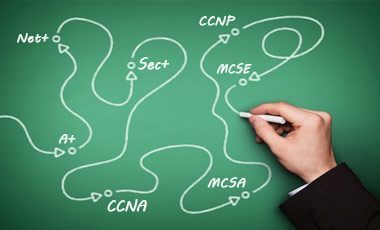1.CCIE: Cisco Certified Internetwork Expert
An evergreen and high-value networking certification is the Cisco Certified Internetwork Expert (CCIE), which comes in several tracks. The annual production of CCIEs remains small enough that Cisco can still claim to hire all of them itself, with demand and appreciation for this difficult and rewarding certification always stratospheric. Over the past few years, the Storage Networking credential gave way to Collaboration, and a Data Center credential was introduced.
Although the road to obtaining the CCIE is long and hard, it is well worth the effort, time and money. This is a credential that will open doors to plenty of job opportunities and high salaries for networking pros.
2. CCNP: Cisco Certified Network Professional
The Cisco Certified Network Professional (CCNP) takes aim at platforms and products from a leading networking equipment vendor found at most communications and internet service providers, not to mention enterprises and businesses of all sizes, as well as government, research and academia. It's hard to go wrong by earning Cisco certification nowadays, and the CCNP is its leading midrange credential across a wide variety of specialties.
Cisco offers several flavors of the CCNP: Cloud, Collaboration, Data Center, Routing and Switching (the most popular), Security, Service Provider and Wireless. The Cisco Certified Network Associate (CCNA) is a required stepping stone to the CCNP. What usually comes after the CCNP for networking professionals could be another CCNP (different specialty), one or more Cisco Specialist certifications, or the advanced Cisco Certified Internetwork Expert (CCIE), which is also available in numerous specializations.
3.JNCIE-ENT: Juniper Networks Certified Enterprise Routing and Switching Expert
Juniper Networks designs and sells routers, firewalls and all kinds of networking solutions aimed at data center environments. Its well-known network operating system for routing, switching and security is called Junos OS, and figures prominently in Juniper devices and equipment. As such, the company is a top competitor to (that is, engages in fabric wars with) Cisco, Brocade, HPE and other networking powerhouses.
Juniper formed the Juniper Networks Certification Program (JNCP) several years ago to ensure a workforce capable of supporting the company's hardware and software solutions. The part of this program that focuses on Junos-based credentials includes Associate, Specialist, Professional and Expert levels across four tracks: Data Center, Service Provider Routing and Switching, Enterprise Routing and Switching and Junos Security.
We favor the upper-tier Enterprise Routing and Switching-Expert (JNCIE-ENT) certification because of its cachet in the industry and its salary-generating capability. This credential requires candidates to achieve the Professional certification first and then to pass an eight-hour, hands-on exam. Once earned, the certification is valid for three years.
4. WCNA: Wireshark Certified Network Analyst
Founded in 2007 by major networking geeks Gerald Combs and Laura Chappell, Wireshark University offers only a single certification but makes it worth your while. The Wireshark Certified Network Analyst (WCNA) recognizes knowledge of network sniffing and analysis using Wireshark, as well as TCP/IP network communications, network troubleshooting and network security. To achieve this credential, candidates must pass one multiple-choice exam, which is DoD 8570 certified.
The WCNA is good for three years, but certification holders must obtain a total of 20 continuing professional education (CPE) credits each year to maintain their credentials in good standing. These CPE credits must focus on activities related to the WCNA exam objectives (sniffing, analysis, etc.) and not be tied directly to job tasks. For example, attending a Sharkfest or Black Hat conference, or even reading the Wireshark Network Analysis Study Guide, can net some CPEs.


0 Comments
No Comments
LEAVE COMMENT